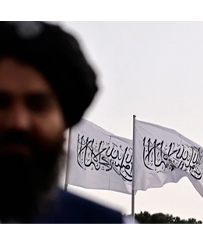The UN, with US leadership, must reimpose the Taliban travel ban

By Annie Pforzheimer
In June, the United Nations Security Council must decide whether to adjust the current regime of sanctions against Taliban leadership. It’s a consequential decision.
U.N. sanctions on the Taliban for years had included a ban on the leadership’s international travel, but the Security Council suspended that ban three years ago for the sake of a “reconciliation” process that has failed, miserably.
Taliban leaders are nonetheless still free to travel because the council renewed that exemption — incredibly — as recently as March, somehow hoping that even more concessions to the group would bring about positive change.
If there ever had been a reasonable rationale for waiving the travel ban, it’s hard to imagine what the argument is today, more than a half year since the Taliban captured Kabul and reimposed its violent and repressive will on tens of millions of Afghans.
When the issue comes to the council next month the United States must use its powers of persuasion, and, if necessary, its veto, to stand against any further attempts to extend the travel ban exemption.
To some, allowing the Taliban to travel outside Afghanistan might seem a small concession. But it represents the creeping normalization of international relations with a regime that overthrew a constitutional republic and an official ally of the U.S., has murdered our allies and stolen the rights of its people and — most relevant in this case — is still openly cooperating with other terrorists.
Under U.N. Security Council Resolution 1988, which extended an even older set of sanctions from before 9/11, travel bans on the Taliban leadership accompany financial sanctions and weapons embargos. The bans are linked to terrorism. They apply to those acting or cooperating with those who are threatening the peace, stability and security of Afghanistan and link to the Taliban’s ties to Al Qaeda and other groups carrying out those activities.
The Security Council lifted the travel bans on senior Taliban leaders in April 2019 for one purpose only: to allow those representatives to attend Doha-based negotiations and travel elsewhere to “support reconciliation” with fellow Afghans. That concept was a dangerous delusion when paired with open U.S. impatience to end our troop presence.
Taliban leaders used their travel freedom to cut separate deals with Russia, China and other neighbors, reinforcing their quasi-governmental status while refusing to negotiate with the elected Afghan government. They successfully waited out the U.S. and NATO and have managed to denude Afghans of their basic rights, while waiting for full recognition.
However, U.N. sanctions, most recently renewed in December 2021, remain in place because the facts of the case are undeniable. The Taliban espouses terrorism and hosts al Qaeda and other international terror regimes on Afghan soil. The Congressional Research Service recently documented the continued and growing presence of terror groups like al Qaeda in Afghanistan, with the clear cooperation of the Taliban. And the Taliban itself announced earlier this year that it would form a battalion of suicide bombers — or “martyrdom brigades” — to carry out “special operations” “under the control of the ministry of defense.” ISIS, while not supported directly by the Taliban, is perpetrating deadly attacks under the regime’s nose, proving false the belief that there is effective Taliban counter-terror cooperation with the West.
They are not even pretending to seek political reconciliation that would justify travel, as their documented crimes continue, including reprisal killings, disappearances and the total shutdown of women’s rights to education, work and freedom of movement — documented by eyewitnesses, human rights defenders and the Security Council.
Suspending the travel ban has allowed the Taliban to pursue the diplomatic recognition it craves, setting in motion the creeping normalization of an authoritarian and extremist movement that other groups will emulate. It is bad enough that the Chinese Foreign Minister visited Kabul the same day that the Taliban denied girls education over the age of 12, in order to discuss political and economic ties, including the mining sector. It is outrageous that, without a travel ban in place, the Taliban senior leaders are returning the gesture and visiting China themselves.
Furthermore, if only to keep a foreign policy toolkit in good working order, the U.S. has an obligation to stand by a serious sanctions regime that still has meaning. Sanctions are a unique policy instrument, as we have seen in the response to Russia’s invasion of Ukraine. As director for the State Department’s Office of Peacekeeping and Sanctions when UNSCR 1988 was consolidated, I participated in the policy debates over how to wield this tool. Sanctions should rise and fall on their own merits, based on the reasons they were imposed in the first place, not traded for unrelated concessions.
UFO hearing: Pushing the frontiers of science with government dataChildren and youth were forgotten at the second global COVID-19 summit
It is in the U.S. national security interest to curb the Taliban’s active destabilization of Afghanistan and the region. Indeed, with their hands on all the levers of power within Afghanistan and with cooperative ties to many other terror groups beyond the country’s borders, the Taliban are more dangerous than ever. That’s why the sanctions against the Taliban must remain — fully — in place.
The U.S. gave away nearly all its negotiating leverage in its fruitless attempt to get the Taliban regime to behave as a responsible member of the international community. But the group does care about sanctions. All the more reason to put them on notice now and take back the travel ban suspension.
Annie Pforzheimer is a former acting deputy assistant secretary of State for Afghanistan, former deputy chief of mission in the U.S. Embassy in Kabul, and a member of the steering committee of Alliance in Support of the Afghan People.
Academicians and Officials interested to publish their academic pieces on this page, please approach us through: opinions@aiss.af
The article does not reflect the official opinion of the AISS.
